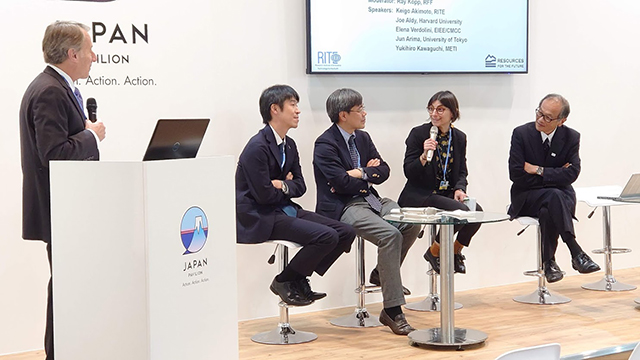イベントスケジュール - COP25 JAPAN PAVILION
2019.12.11
11:30 - 12:45
2019.12.11
Innovation
Mitigation and Adaptation
International Coordination in Efforts of Climate Change Response Measures
Organizer
- Research Institute of Innovative Technology for the Earth (RITE)
Co-Organizer
- Resources for the Future (RFF)
- Duke University
Event Overview
Agenda of the Event
-
Introduction (5min)
Raymond Kopp (Vice President, Senior Fellow, Resources for the Future (RFF)) -
Opening Remark
Yukihiro Kawaguchi (Director, Global Environmental Affairs Office, Ministry of Economy, Trade and Industry (METI)) -
Presentation 1 (10min) : Evaluations on International Competitiveness of NDCs and the Implications of Long-Term Deep Emission Reductions
Keigo Akimoto (Group Leader, Chief Researcher, Systems Analysis Group, Research Institute of Innovative Technology for the Earth (RITE)) -
Presentation 2 (10min) : Transparency in Climate Policy: Evaluating Nationally Determined Contributions
Joe Aldy (Professor, Harvard University) -
Presentation 3 (10min) : Taking stock to inform the global stock-take environmental policies and decarbonization challenges
Elena Verdolini (Senior Researcher, European Institute on Economics and the Environment (EIEE)) -
Comment (5min)
Jun Arima (Professor, University of Tokyo) - Discussion, Q&A (30min)
Speaker
- Keigo Akimoto, Research Institute of Innovative Technology for the Earth (RITE), Group Leader, Chief Researcher, Systems Analysis Group
- Raymond Kopp, Resources for the Future (RFF), Vice President, Senior Fellow
- Joe Aldy, Harvard University, Professor
- Elena Verdolini, European Institute on Economics and the Environment (EIEE), Senior Researcher
- Jun Arima, The University of Tokyo, Professor
- Yukihiro Kawaguchi, Ministry of Economy, Trade and Industry (METI), Director, Global Environmental Affairs Office
Event Materials
Event Summary
- After Raymond Kopp introduced this session, Yukihiro Kawaguchi delivered an opening remark.
- Keigo Akimoto presented RITE's analysis on each countries' marginal abatement costs in NDCs and their economic impacts. He indicated that marginal abatement costs under current NDCs are significantly different among countries and thus may hinder efficient emissions reductions or induce carbon leakage through international trade, therefore coordination of NDCs through review processes are important. He also pointed that innovations both in energy supply side and demand side are necressary for achieving 2℃ target or deeper emissions reduction, as international coordination based on high carbon price is not realistic.
- Joe Aldy presented analysis on marginal abatement costs under NDCs, SCC, 2℃ pathway using IAM, analysis on impacts of carbon prices under NDCs on countries' competitiveness, and analysis on BAU using statistical forecasting models. He pointed out that assessment of heterogeneity in NDCs or adequacy of BAU forecasts using various economic tools may inform increased transparency.
- Elena Verdolini presented a systematic evaluation of environmental policy impacts, indicating that disagreements in the available literature exist more in distributional and competitive outcomes and that well-designed policies can help lower the transitional costs of decarbonization. She also pointed that exploring impacts of digitalization on socio-economic aspects is necessary.
- Jun Arima commented political infeasibility of coordination of NDCs among nations, barriers for border carbon tax to be agreed internationally, necessity of climate action which accelerates innovation rather than increasing mitigation levels, reduction of mitigation cost and demand side potentials with digitalization.
- After presentation, discussion was made by the speakers. They argued that globally uniform carbon tax is not realistic, unilateral border carbon tax may induce economic protectionism or environmemtal protectionism, distributional impacts of border tax adjustment within countries should be noticed, necessary costs for just transition should be discussed, and systematic analysis should be expanded to developing countries.
Message and Results
This session clarified significance and necessity of coordination of NDCs, as well as an importance of assessing NDCs with using multiple tools to achieve effective emissions reduction. The session also pointed that to inform of the impacts of climate policies on socio-economic aspects or competitiveness is useful for crafting climate policies. It is also pointed out, in practice, that innovation which contributes to mitigation is crucial.

Other Events On This Day
10:00 - 11:15
2019.12.11
Mitigation and Adaptation
Innovation
Progress of NDC and City Climate Action (Locally Determined Contributions) in Asia
National Institute of Environmental Studies (NIES)
11:30 - 12:45
2019.12.11
Innovation
Mitigation and Adaptation
International Coordination in Efforts of Climate Change Response Measures
Research Institute of Innovative Technology for the Earth (RITE)
14:30 - 15:45
2019.12.11
Mitigation and Adaptation
16:00 - 17:15
2019.12.11
Innovation
Innovative approaches to attain UN SDGs and the Paris Agreement with climate change mitigation and economic growth
Global Industrial and Social Progress Research Institute
18:00 - 19:30
2019.12.11
Innovation
Leap ahead to Decarbonization: The launching event of the latest ICEF Roadmap on "Industrial Heat Decarbonization"
New Energy and Industrial Technology Development Organization (NEDO)